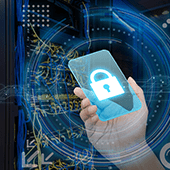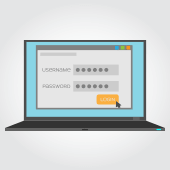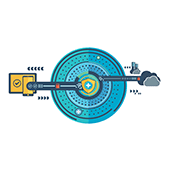There’s a new cyberattack in town, and it’s out to get your Bitcoins. Cryptojacking has grown in popularity over the past few months mainly because of the increasing value of cryptocurrency. So if you notice your computer slowing down, hackers may already be using your hardware to make easy money.
Hijacked hardware
Cryptojacking secretly uses your computer to calculate complex mathematical problems to generate cryptocurrency. They get inside by using phishing emails to lure victims into clicking on a link, which then runs malicious cryptomining programs on the computer. Any cryptocurrency produced then gets delivered to the hacker’s private server.
But hackers have developed an even more insidious tactic. By infecting websites with ads and plugins that run cryptojacking code, any visitor who loads the web page instantly gets infected with the malware, sending their computer’s processor into overdrive trying to generate cryptocurrency.
Unlike most malware, cryptojacking software won’t compromise your data. But it will hijack your hardware’s processing power, decreasing performance while increasing your power and cooling bills. So instead of paying for the computing power themselves, hackers can simply use thousands of compromised computers.
Surge in cryptojacking
It’s difficult to tell how much hackers are making with cryptojacking, but there’s a good chance that this type of attack will be as popular as ransomware was in 2017. In fact, for as little as $30, anyone can purchase a cryptojacking kit from the dark web to force other computers to generate Bitcoin or Monero for them.
According to several reports, even sites like The Pirate Bay, Openload, and OnlineVideoConverter are allegedly using cryptojacking exploits to diversify their revenue streams.
The biggest reason why this is becoming so popular is because it’s a low-risk, high-reward scheme. Instead of extorting money directly from the victim, hackers can secretly generate digital currencies without the victim knowing.
If it is detected, it’s also very hard to track down who initiated the attack. And since nothing was actually “stolen” (other than a portion of computing power), victims have little incentive to apprehend the culprit.
Prevention and response
To avoid cryptojacking, you need to incorporate it into your monthly security training sessions. Teach your employees to practice extra caution with unsolicited emails and suspicious links. Using ad-blocker or anti-cryptomining extensions on web browsers is also a great way to stay protected.
Beyond prevention, use network monitoring solutions to detect any unusual behavior with your computers. For example, if you notice a significant number of PCs running slower than usual, you should assume that cryptojacking is taking place.
If you’ve confirmed that it is, advise your staff to close browser tabs and update browser extensions as soon as possible.
Cryptojacking may seem less threatening than some malware we’ve discussed in the past, but it can incur real power, cooling, and performance costs to your business when several systems are compromised. To make sure you don’t end up enriching any hackers, call us today. We offer hardware solutions and cybersecurity tips to keep your business safe and sound.

 The massive success of ransomware like WannaCry and Petya have spurred other cybercriminals to develop their own ransomware and sell it on the black market. This means we can expect more ransomware attacks in the future. To prepare your business, you need virtualized disaster recovery solutions. Here’s why.
The massive success of ransomware like WannaCry and Petya have spurred other cybercriminals to develop their own ransomware and sell it on the black market. This means we can expect more ransomware attacks in the future. To prepare your business, you need virtualized disaster recovery solutions. Here’s why. Data security and privacy should be a top priority in this age of constant and downright dangerous cyber attacks. However, in your quest for ultimate security, don’t forget to implement these non-technical steps to shield your business’s IT resources.
Data security and privacy should be a top priority in this age of constant and downright dangerous cyber attacks. However, in your quest for ultimate security, don’t forget to implement these non-technical steps to shield your business’s IT resources. Passwords are a double-edged sword. If you make them too simple, they’ll be easy to guess; if you make them too complex, they’ll be impossible to remember. One solution is to create an uncrackable password and save it to your browser. Unfortunately, recent research suggests that tactic could drastically reduce your privacy.
Passwords are a double-edged sword. If you make them too simple, they’ll be easy to guess; if you make them too complex, they’ll be impossible to remember. One solution is to create an uncrackable password and save it to your browser. Unfortunately, recent research suggests that tactic could drastically reduce your privacy. It’s the perfect time of year to evaluate last year’s technology investments and make adjustments for the year to come. Whether 2017 left you with extra cash in your pocket or desperate for a better way to get work done, here’s a roundup of the best IT news from the past year.
It’s the perfect time of year to evaluate last year’s technology investments and make adjustments for the year to come. Whether 2017 left you with extra cash in your pocket or desperate for a better way to get work done, here’s a roundup of the best IT news from the past year. Installing powerful antivirus software and setting strong passwords are no longer considered the bare minimum in cybersecurity. With hackers, government agencies, and ISPs constantly monitoring networks and your online habits, hopping onto a Virtual Private Network (VPN) is crucial for keeping your surfing habits private. Here’s why.
Installing powerful antivirus software and setting strong passwords are no longer considered the bare minimum in cybersecurity. With hackers, government agencies, and ISPs constantly monitoring networks and your online habits, hopping onto a Virtual Private Network (VPN) is crucial for keeping your surfing habits private. Here’s why. What would you do right now if you discover that your business’s database is hacked and a huge number of your customers’ data gets leaked? Speechless, with dismay, but you need to act, decently. In this case, it helps to have a good incident response plan in place, so your business won’t suffer the same fate as Equifax, which is an interesting story we’re about to tell.
What would you do right now if you discover that your business’s database is hacked and a huge number of your customers’ data gets leaked? Speechless, with dismay, but you need to act, decently. In this case, it helps to have a good incident response plan in place, so your business won’t suffer the same fate as Equifax, which is an interesting story we’re about to tell. What do you call someone who hunts for security gaps in computer hardware and software? A hacker, right? What about someone who takes their findings to vendors to help them improve the quality of their products? There is more than one type of hacker, and understanding the difference is important.
What do you call someone who hunts for security gaps in computer hardware and software? A hacker, right? What about someone who takes their findings to vendors to help them improve the quality of their products? There is more than one type of hacker, and understanding the difference is important. Increased productivity and constant collaboration are two of the main reasons why businesses have integrated a mobile policy into their business. This means an increased use of mobile devices such as smartphones and tablets in daily operations. But as the number of mobile users continues to grow, so does the number of cyber crime. Reduce your IT staff’s headaches by following these steps in protecting your mobile devices.
Increased productivity and constant collaboration are two of the main reasons why businesses have integrated a mobile policy into their business. This means an increased use of mobile devices such as smartphones and tablets in daily operations. But as the number of mobile users continues to grow, so does the number of cyber crime. Reduce your IT staff’s headaches by following these steps in protecting your mobile devices. WannaCry is one of the few malware campaigns to become a household name. It’s educated countless people on the reality of ransomware and the vulnerability of their data. If you’re still worried about whether you’re at risk, we’ve collected everything you need to know right here.
WannaCry is one of the few malware campaigns to become a household name. It’s educated countless people on the reality of ransomware and the vulnerability of their data. If you’re still worried about whether you’re at risk, we’ve collected everything you need to know right here.